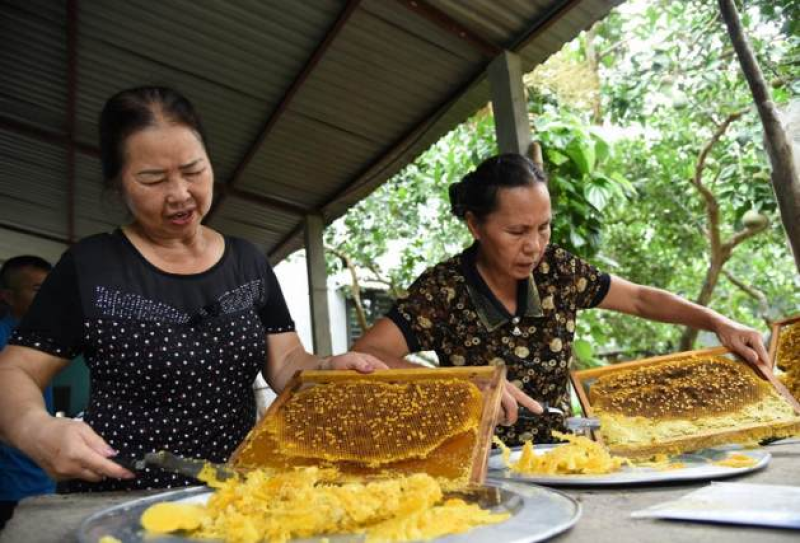- India Sees 9% Drop in Foreign Tourists as Bangladesh Visits Plunge |
- Dhaka Urges Restraint in Pakistan-Afghan War |
- Guterres Urges Action on Safe Migration Pact |
- OpenAI Raises $110B in Amazon-Led Funding |
- Puppet show enchants Children as Boi Mela comes alive on day 2 |
Older People Must Be Central to Global Climate Action

Raising honey bees is one of the income-generating activities of the Older People groups in Vietnam’s Hoa Binh city.
I’ve just returned from the east coast of India, where I witnessed firsthand the harsh challenges that older people in artisanal fishing communities face daily. I saw how community elders — the custodians of marine traditions and the coastal environment — are being overlooked by climate policy and their governments.
As their children migrate inland in search of work, ageing fishers are left behind with only fading memories and a rising sea. Their survival hangs by a thread. The social pension for a couple is just over $50 a month — barely enough for a single daily bowl of rice boiled in seasoned water. Tea has become a luxury. I met widows who, despite living in a fishing community, had not eaten fish in months, and older men who lay on mud floors to cool their blistered bodies and pray for a gust of wind. Their stories are a stark reminder of the human cost of climate change.
Disregarding age in climate action is not just unfair — it is short-sighted. Older people may be more vulnerable to climate impacts if they are mobility-impaired, ill, or socially isolated. Yet they are also sources of knowledge, leadership, and resilience. Age interacts powerfully with climate vulnerability, and failing to understand this dynamic undermines both equity and effectiveness.
When they perish, they pass silently, recorded as victims of “old age” rather than heatstroke — even amid 47°C heatwaves. Cyclones may render them legible as statistics, but during heatwaves, they vanish unnoticed. These are not isolated tragedies — they reflect global climate injustice at its most blatant.
The International Court of Justice ruled on 23 July 2025 that the failure to take climate protection measures is not only immoral and unjust, but also unlawful under international law and constitutes a violation of the right to life.
As we face the escalating climate crisis, with 2025 projected to surpass the record temperatures of 2024, the impact on older people cannot be overstated. In Pakistan, cities reached 50°C. Hospitals in Japan and the UK were overwhelmed with older patients. In Europe, a 2023 summer heatwave claimed 2,305 lives in 12 cities, with a staggering 88% of victims aged over 75.
The Lancet’s 2023 Countdown on Health and Climate Change issued a stark warning: deaths among people over 65 due to heat rose 85% between 1991–2000 and 2013–2022. Yet the voices of older people remain largely absent from climate negotiations, national adaptation plans, and global media. Why? Because of persistent and pervasive structural ageism.
Older people are too often seen as passive burdens rather than as valuable contributors. Take, for example, the difference in media response: when Greta Thunberg confronted world leaders, she was rightly celebrated. But when a group of older Swiss women won a landmark case at the European Court of Human Rights, compelling the Swiss government to align its climate actions with international law, the media coverage was muted — exposing deep-seated age bias.
At HelpAge International, we are working to shift this narrative. During this UN Decade of Healthy Ageing (2021–2030), we are calling for older people to be recognised as a distinct constituency in global climate policy — alongside youth, women, and Indigenous peoples.
We urge climate finance institutions — including the Green Climate Fund, the Adaptation Fund, the Climate Investment Fund, and the Loss and Damage Fund — to establish dedicated windows to support older people-led adaptation and resilience initiatives.
As the planet both ages and heats, it’s vital to address this blind spot in climate action. By 2030, there will be 1.4 billion people aged 60 and above — a figure expected to rise to 2.1 billion by 2050, or one-fifth of the global population.
This demographic shift must be reflected in climate legislation, financial mechanisms, and data systems, which too often ignore the unique vulnerabilities and contributions of older people.
Yet older people aren’t waiting to be included — they are already leading. In India’s Thar Desert, older women are restoring rain-fed agriculture and building earthen dams for water security. In Southeast Asia, older people’s associations are producing bamboo biochar for carbon storage. In Ethiopia and Thailand, cooperatives of older people are creating climate-resilient value chains in honey, aloe vera, and agroforestry. These are not pilot projects — they are scalable models of resilience that deserve institutional support.
We advocate for an age-inclusive heat resilience strategy, inspired by practical innovations from Latin America, Africa, and Asia. These include retrofitting homes with traditional cooling features like mud floors and shaded courtyards, creating age-friendly infrastructure with covered walkways and accessible water points, and developing green public spaces that serve both cooling and intergenerational purposes.
These strategies are not only beneficial for older people — they uplift entire communities and represent smart, inclusive investments in our shared future.
Disregarding age in climate action is more than unjust — it’s a failure of imagination and policy. Older people may be vulnerable, but they are also resilient, wise, and indispensable to the climate solution.
There is no true climate justice without inclusion. And inclusion is incomplete if older people are left behind.

